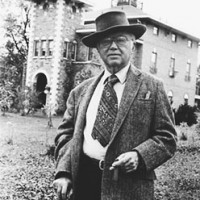Russell Kirk on Cultivating the Good Life, by Bruce Frohnen
When Russell Kirk passed away he was surrounded by his loving family, in the house he built on his ancestral land. This was fitting for a man who always wished to lead a life of “decent independence.” He had sought to provide for his family while remaining free from compromising entanglements. He did not want gratitude to some benefactor to cloud his judgment or tempt him to defend the “Permanent Things” with less than his full vigor.
Kirk knew the value of economic liberty. Living by his wit and wisdom he could support himself only in a free economy. Only a free market could produce the publishing houses and other organizations that helped him put his views before the public. Only economic liberty allowed the public to accumulate disposable time and money to spend considering his ideas.
But Kirk’s goal was never wealth. It was economic independence. It was the freedom to do what was right without fear of the taxman, the bank repossessor, or an angry patron.
Money is a necessity of life, and economic effort should be rewarded. But we must not mistake the pursuit of money for the pursuit of a good life. Kirk sought to preserve his life in Mecosta and this required, among other things, money. But he who pursues money for its own sake will lose his Mecosta—his ties to his ancestors, his ability to love and be loved by his family, his understanding that it is in a moral life that man is free, not in a life chained to the constant pursuit of short-lived, worldly pleasures.
The pursuit of money for its own sake constitutes the deadly sin of avarice; a sin with which our age is all too familiar. As Kirk argued,
Avarice has been the exacting passion of society for more than a century. In every age, for that matter, avarice—like the other deadly sins—is incalculably powerful; but societies governed by moral tradition always have endeavored to keep this rice wader by the employment of countervailing farces and impulses, if only by the power of satirical admonition. Our modern lime, however, has seen the relaxation of nearly every curb upon avarice. Avarice, naked or veiled, now is popularly acclaimed a virtue.
We have mistaken greed for industry, sin for virtue, a comfortable life for a good life. Those who find in free markets the key to happiness have fallen under the same spell of ideology that controls Marxists and other worshippers of the state. They seek a ready, universal mechanism—be it market or state—that will solve all life’s problems. But there is no mechanism that can produce utopia. And the attempt to build one produces only misery. Any decent life requires that we seek to protect and enrich our culture—the historically given institutions, beliefs, and practices that make up our way of life.
Kirk’s magnum opus The Conservative Mind forged a conservative movement that has lasted forty years precisely because it was a work of cultural conservatism. It gave no ideological blueprint for the “good society.” Instead it told the story of our conservative patrimony—of seers who have set forth important visions of the good life. It pointed readers not toward abstract philosophy or mechanistic institutions, but toward the eternal standards of natural law and our inheritance of custom and prescription.
Today cultural conservatism is criticized as irrelevant, dangerously reactionary, or worst of all banal by “sophisticated” observers. And not just by liberals, but also by many within the conservative movement. The past is past, we are told. We must look forward to an age in which we will construct, for ourselves, a freer, more prosperous life. We will maintain social peace with rules and contracts of mutual benefit, secure in the knowledge that we can satisfy our deepest longings if only freed to do so. Certain customs may be useful, on this view, but we must not enslave ourselves by holding onto an unjust (“racist, sexist, and homophobic”) and irretrievable past.
This rejection of tradition rests on the conviction that what makes us distinctly human (if anything) is our ability to decide for ourselves what kind of life we should live, and to put such decisions into action through our choice of career, sexual conduct, and political life. The key word, of course, is ‘choice.” We must be free to choose our own lifestyle and character.
But when we see choice as itself the proper goal of life, or even politics, we feed into liberal materialism and moral relativism. Kirk did not argue that choice is in itself evil. Instead he pointed out that our true choice is between a life of authentic freedom, in which we seek to serve God, and a life in which we enslave ourselves to our own base appetites.
Taken by itself, choice is essentially empty. Choice means freedom to choose. Freedom to choose means a lack of constraints. And, unfortunately, freedom from constraints has come to mean freedom from all constraints—including religious sanction, custom, and material scarcity or poverty.
Read the complete article in The Imaginative Conservative
